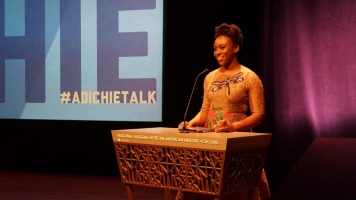One hundred seventy-five lucky GW students, faculty, and conference attendees were invited to a talk by Nigerian author, Chimamanda Ngozi Adichie, held April 21 at the Smithsonian’s National Museum of African American History and Culture.
The event was the culmination of a two-day conference held at GW and co-sponsored by the Elliott School of International Affairs, the Institute for African Studies, and the Columbian College of Arts and Science entitled: Remembering Biafra: History, Memory & The Global Impact of the Nigerian Civil War. Reinvigorating interest in Biafra and the Civil War was a focus of the conference.
If you are not familiar with the 1967 Nigerian Civil War, you are not alone. Although it was hugely significant, it has largely fallen out of the American public's memory. Other historical events from the era have maintained a stronger hold on the country’s collective conscience.
For instance, dubbed the “Summer of Love,” 1967 witnessed 70,000 protesters marching against the War in Vietnam in Washington, D.C.; the Soviets conducting a nuclear test, unnerving the world at the height of the Cold War; and one of the worst riots in US history continuing for five days in Detroit. In the midst of these events, Nigerian forces invaded the secessionist Biafra in Eastern Nigeria, igniting the Nigerian Civil War.
Adichie’s novel, Half of a Yellow Sun, is summarized in her break out TED Talk as “inspired by Nigerian history and tragedies all but forgotten by recent generations of westerners.” The TED site describes Adichie as an author who “seeks to instill dignity into the finest details of each character, whether poor, middle class, or rich, exposing along the way the deep scars of colonialism in the African landscape.” The talk, “The Danger of a Single Story,” has been viewed more than 12 million times.
Adichie’s lecture at the Smithsonian focused primarily on her journey as an author, motivated by her determination to keep the memories of her family’s experience in Nigeria’s Igboland alive. The Q&A portion, moderated by the conference organizer, GW Associate Professor of American Studies and International Affairs, Melani McAlister, ranged across a variety of issues, including Adichie’s growing reputation as an outspoken black feminist. The livestream of the public lecture captured more viewers than any livestreamed event thus far at the museum.
Asked to respond if she is a different kind of feminist in Nigeria as opposed to the US, Adichie had this to say, “the interesting thing about sexism and how it manifests itself in both countries — and it’s not about better or worse, really— but it’s that, its overt in Nigeria, so you know what you’re dealing with, and in the US, it's layered and so covert that it makes it in some ways even more mentally exhausting.” The rapt audience responded with a cheer. “See, they understand what I am talking about,” said Adichie with a smile.
View photos from the event on the Elliott School’s Flickr page.


